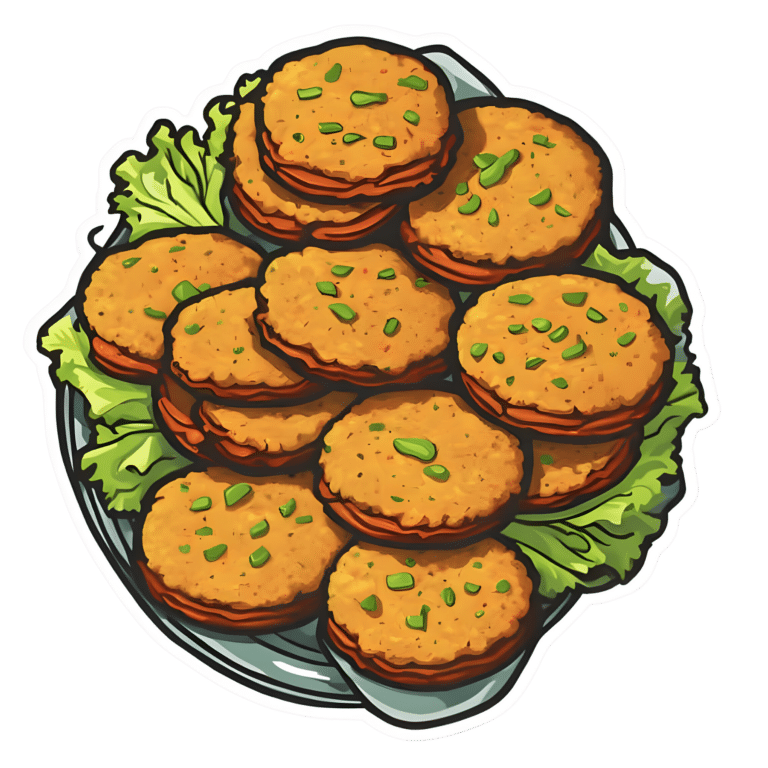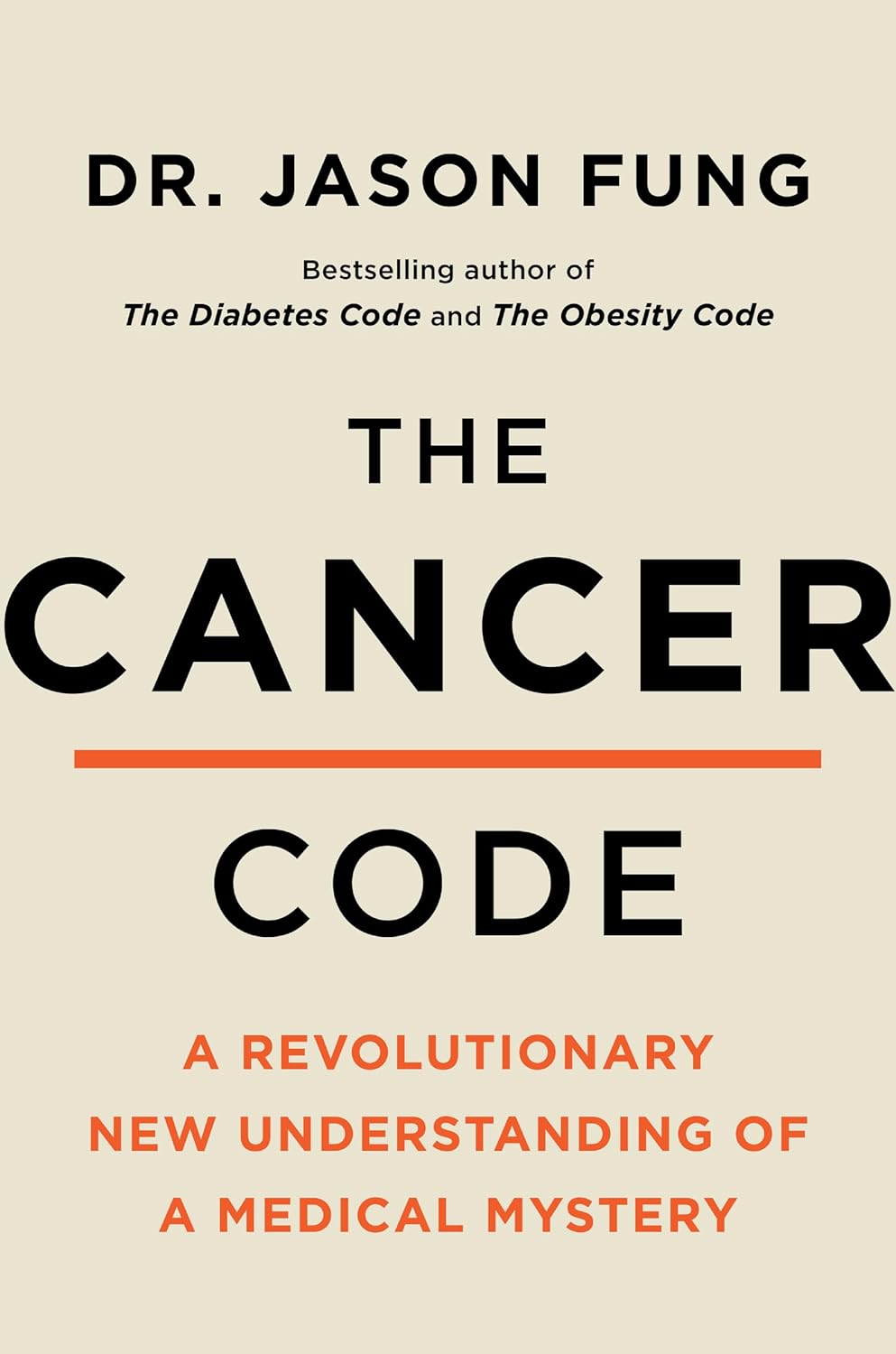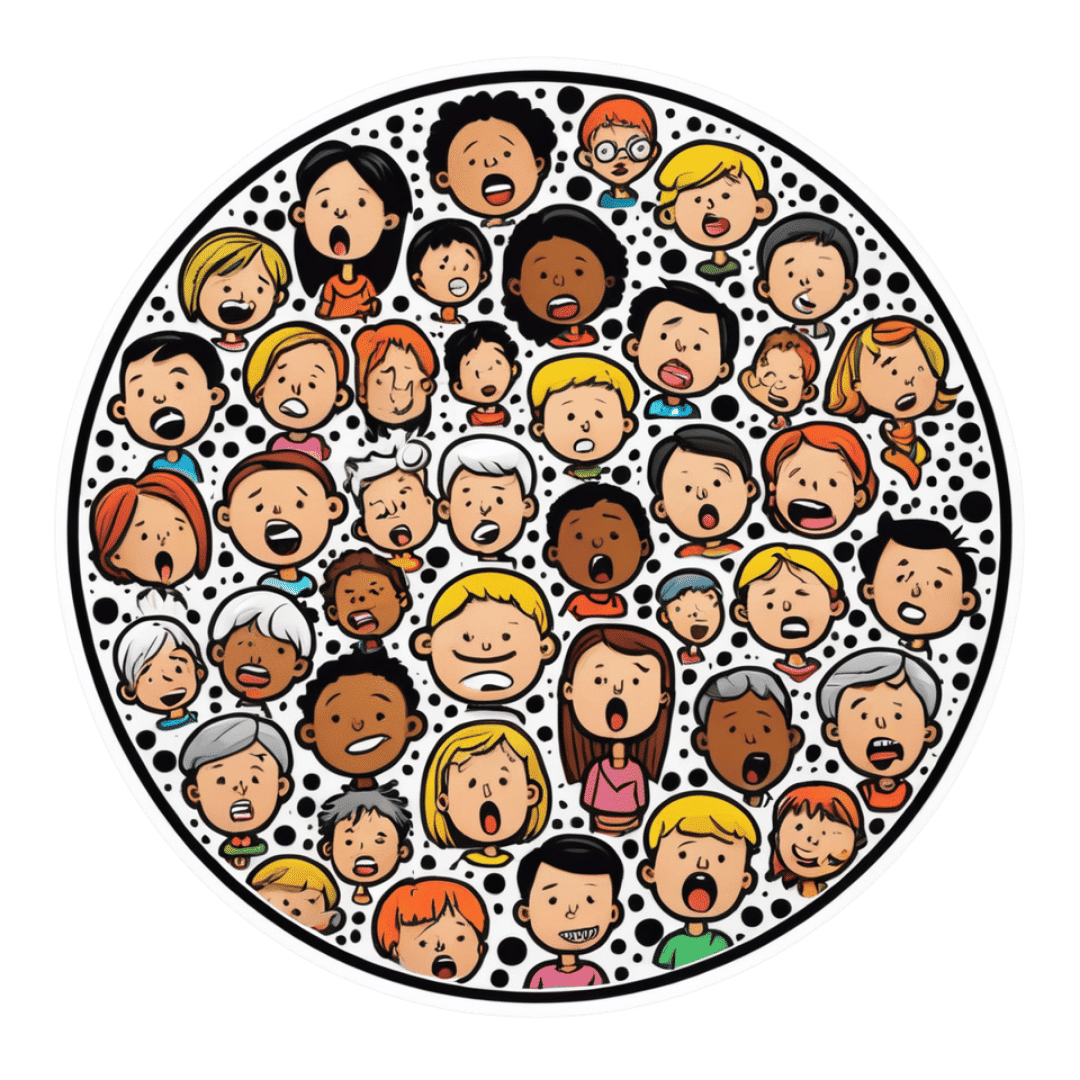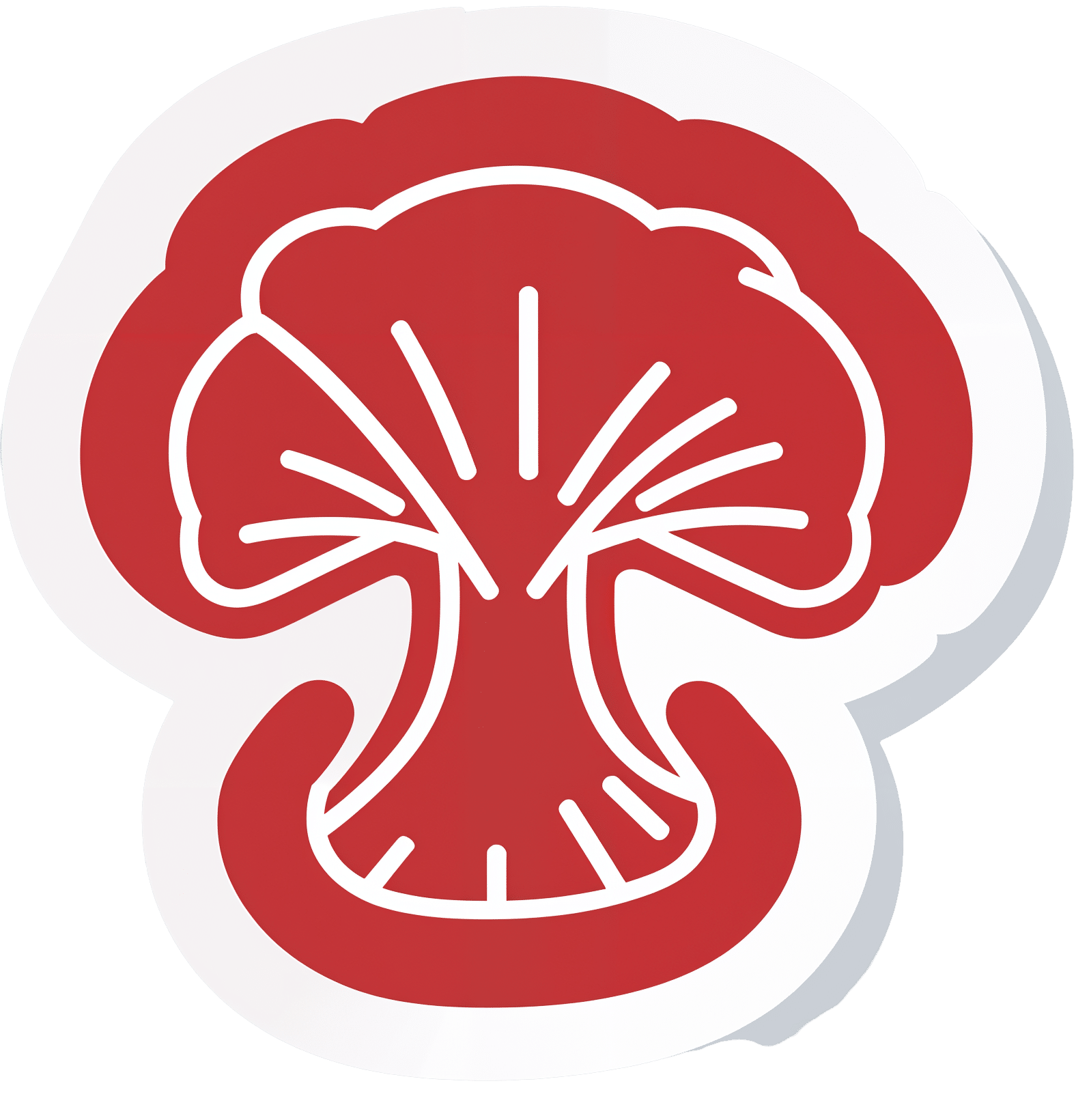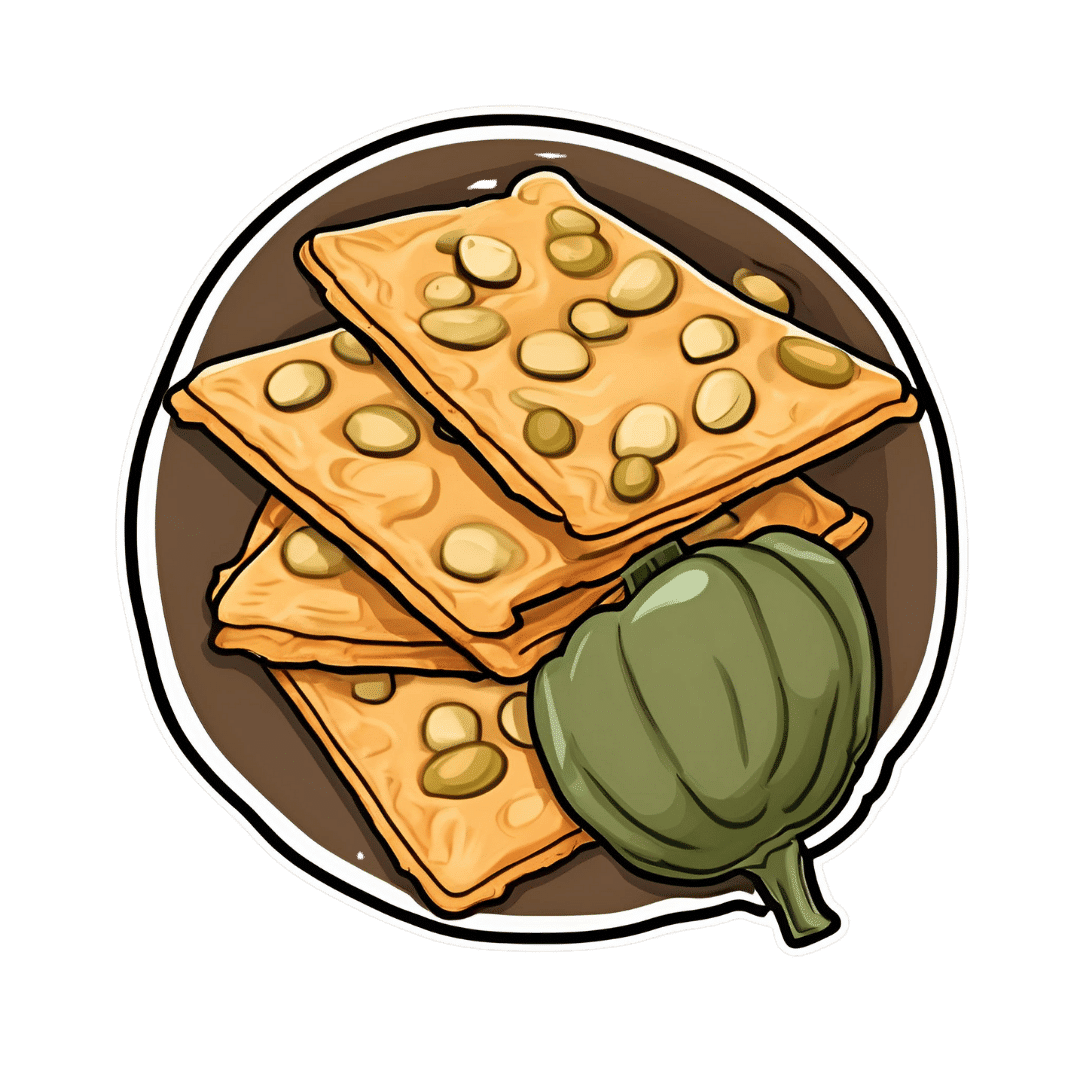
Pumpkin Protein Crackers
10almonds is reader-supported. We may, at no cost to you, receive a portion of sales if you purchase a product through a link in this article.
Ten of these (give or take what size you make them) will give you the 20g protein that most people’s body’s can use at a time. Five of these plus some of one of the dips we list at the bottom will also do it:
You will need
- 1 cup chickpea flour (also called gram flour or garbanzo bean flour)
- 2 tbsp pumpkin seeds
- 1 tbsp chia seeds
- 1 tsp baking powder
- ¼ tsp MSG or ½ tsp low-sodium salt
- 2 tbsp extra virgin olive oil
Method
(we suggest you read everything at least once before doing anything)
1) Preheat the oven to 350℉ / 180℃.
2) Combine the dry ingredients in a mixing bowl, and mix thoroughly.
3) Add the oil, and mix thoroughly.
4) Add water, 1 tbsp at a time, mixing thoroughly until the mixture comes together and you have a dough ball. You’ll probably need 3–4 tbsp in total, but do add them one at a time.
5) Roll out the dough as thinly and evenly as you can between two sheets of baking paper. Remove the top layer of the paper, and slice the dough into squares or triangles. You could use a cookie-cutter to make other shapes if you like, but then you’ll need to repeat the rolling to use up the offcuts. So we recommend squares or triangles at least for your first go.
6) Bake them in the oven for 12–15 minutes or until golden and crispy. Enjoy immediately or keep in an airtight container.
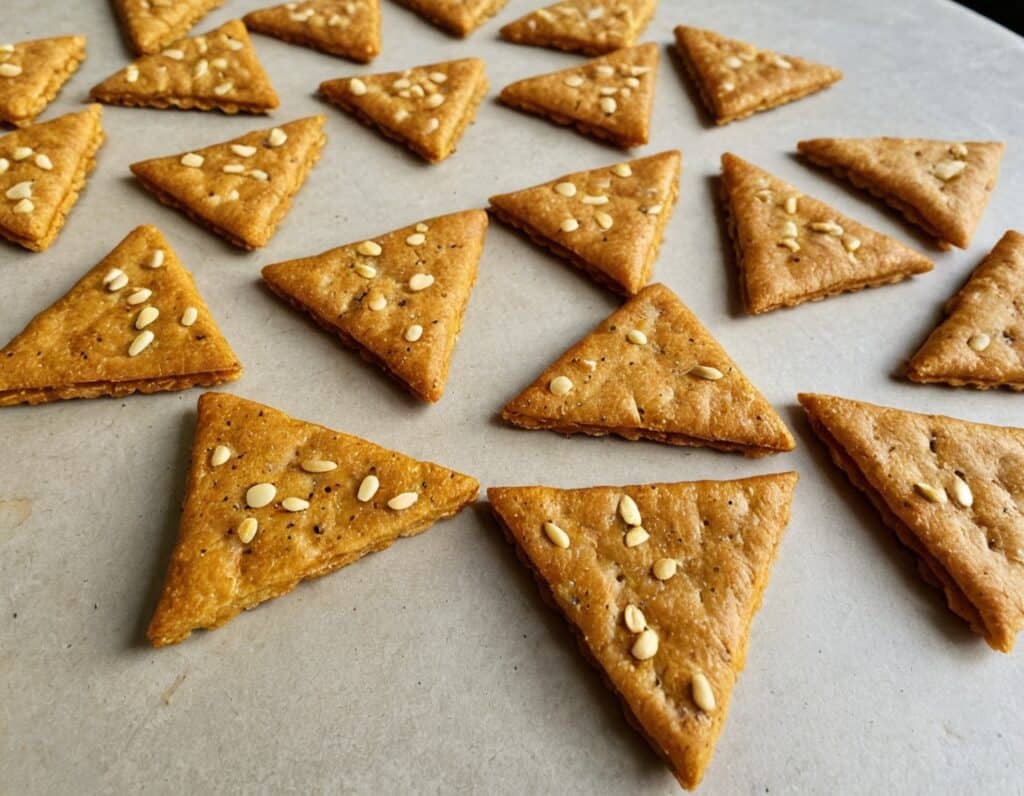
Enjoy!
Want to learn more?
For those interested in some things to go with what we have going on today:
- Muhammara ← this is a very nutritionally-dense dip (not to mention tasty; seriously, check out these flavors)
- Hero Homemade Hummus ← a classic
- Plant-Based Healthy Cream Cheese ← also a very respectable option
Take care!
Don’t Forget…
Did you arrive here from our newsletter? Don’t forget to return to the email to continue learning!
Recommended
Learn to Age Gracefully
Join the 98k+ American women taking control of their health & aging with our 100% free (and fun!) daily emails:
-
What Menopause Does To The Heart
10almonds is reader-supported. We may, at no cost to you, receive a portion of sales if you purchase a product through a link in this article.
World Menopause Day: Menopause & Cardiovascular Disease Risk
Today, the 18th of October, is World Menopause Day.
The theme for this year is cardiovascular disease (CVD), and if your first reaction is to wonder what that has to do with the menopause, then this is the reason why it’s being featured. Much of the menopause and its effects are shrouded in mystery; not because of a lack of science (though sometimes a bit of that too), but rather, because it is popularly considered an unimportant, semi-taboo topic.
So, let’s be the change we want to see, and try to fix that!
What does CVD have to do with the menopause?
To quote Dr. Anjana Nair:
❝The metabolic and clinical factors secondary to menopause, such as dyslipidemia, insulin resistance, fat redistribution and systemic hypertension, contribute to the accelerated risk for cardiovascular aging and disease.
Atherosclerosis appears to be the end result of the interaction between cardiovascular risk factors and their accentuation during the perimenopausal period.
The increased cardiovascular risk in menopause stems from the exaggerated effects of changing physiology on the cardiovascular system.❞
Source: Cardiovascular Changes in Menopause
See also: Menopause-associated risk of cardiovascular disease
Can we do anything about it?
Yes, we can! Here be science:
- Menopause Transition and Cardiovascular Disease Risk: Implications for Timing of Early Prevention: A Scientific Statement From the American Heart Association
- Cardiovascular risk in menopausal women and our evolving understanding of menopausal hormone therapy: risks, benefits, and current guidelines for use
This (in few words: get your hormone levels checked, and consider HRT if appropriate) is consistent with the advice from gynecologist Dr. Jen Gunter, whom we featured back in August:
What You Should Have Been Told About The Menopause Beforehand
What about lifestyle changes?
We definitely can do some good things; here’s what the science has to say:
- Mediterranean diet: yes, evidence-based
- High soy consumption: mixed evidence, unclear. So, eat it if you want, don’t if you don’t.
- Supplements e.g. vitamins and minerals: yes, evidence-based.
- Supplements e.g. herbal preparations: many may help, but watch out for adverse interactions with meds. Check with your pharmacist or doctor.
- Supplements; specifically CBD: not enough evidence yet
- Exercise: yes, evidence-based—especially low-impact high-resistance training, for bone strength, as well as regular moderate-intensity exercise and/or High-Intensity Interval Training, to guard against CVD.
For a full low-down on all of these:
Revealing the evidence-based lifestyle solutions to managing your menopause symptoms
Want to know more?
You can get the International Menopause Society’s free downloadable booklet here:
Menopause & Cardiovascular Disease: What Women Need To Know
You may also like our previous main feature:
What Does “Balance Your Hormones” Even Mean?
Take care!
Share This Post
-
Exercising With Less Soreness!
10almonds is reader-supported. We may, at no cost to you, receive a portion of sales if you purchase a product through a link in this article.
An Ancient Sports Drink & Healing Potion, Now With Modern Science?
Ginseng has many health benefits, we talked about 8 of them in this previous edition of 10almonds:
…but we’ve somehow never yet done a Monday’s Research Review for it! We must do one, one of these days. For now though, it’s Saturday’s Life Hacks, and we’re here with…
Speeding up recovery after muscle damage
We talked about this topic before too:
Overdone It? How To Speed Up Recovery After Exercise
…which gives very good advice (including some supplements that help), but was published before the latest science that we’re going to talk about today:
A team of researchers all so very recently found that ginseng also reduces muscular fatigue and, importantly, hastens recovery of muscle damage caused by exercise.
And that’s not all…
❝It should also be noted that, by reducing fatigue, taking ginseng on a regular basis may also help reduce the risk of injury, particularly in the case of muscles or ligaments, which can in turn improve athletic performance.❞
This means that it can be taken regularly and prophylactically, as they found:
❝taking ginseng systematically for a long time can mitigate the response of the biological markers, mainly creatine kinase (CK) and interleukin 6 (IL-6), responsible for exercise-induced muscle damage and inflammation.❞
You may be thinking “isn’t creatine good?” and yes, yes it is:
Creatine: Very Different For Young & Old People
…however, creatine kinase is not creatine. Creatine kinase (CK) is an enzyme that affects the creatine (to put it in few words, without getting into the fascinating biochemistry of this). Now, it’s necessary for us to have some CK (or else we wouldn’t be able to do what we need to with the creatine), but elevated levels often indicate some sort of problem going on:
Approach to asymptomatic creatine kinase elevation
…so ginseng keeping those things balanced is a good thing.
The study
We’ve talked a lot about the findings and what they mean, but if you’d like to read the paper for yourself, you can read it here:
Effect of Ginseng Intake on Muscle Damage Induced by Exercise in Healthy Adults
Where to get ginseng
If you’d like to take ginseng as a supplement, then there are many ways to do so, with the most common being capsules or ginseng tea, which has an interesting and distinctive taste, and is very refreshing. Here are examples on Amazon, for your convenience:
Enjoy!
Share This Post
-
The Cancer Code − by Dr. William Fung
10almonds is reader-supported. We may, at no cost to you, receive a portion of sales if you purchase a product through a link in this article.
We have previously reviewed, by the same author, “The Obesity Code” and “The Diabetes Code”, so, what does this one offer that’s new?
Mostly, it’s just a new focus, because the dietary approach is basically the same (because all three are fundamentally metabolism-related), with some small tweaks for cancer-specificity. If you’ve read one or more of the other books, you can probably comfortably get away with skipping this one, unless you or a loved one presently has cancer and you’re doing your best to squeeze out any extra 1% of anticancer potential.
Indeed, the former two books assumed that you are affected by obesity or diabetes, respectively, and this one assumes you are at least particularly concerned by cancer—he doesn’t assume you have it (although he does cover that too); he assumes however that you perhaps have a known risk factor or some other similar reason to be focusing on this.
To oversimplify a lot, the dietary approach recommended involves practising intermittent fasting, and also adjusting one’s diet to reduce fasting blood sugar levels and postprandial (after eating) blood sugar and insulin levels. Shocking nobody, he advocates for a lot of plants; he does however recommend a moderately low-carb diet (e.g. legumes are fine but maybe skip the fries).
The style is on the hard end of pop-science, while still quite readable provided one takes one’s time, and there are more than 30 pages of scientific references.
Bottom line: if you’d like to make your diet as anticancer as possible, this book will show you how.
Click there to check out The Cancer Code, and eat to beat cancer!
Share This Post
Related Posts
-
Measles, Memory, & Mouths
10almonds is reader-supported. We may, at no cost to you, receive a portion of sales if you purchase a product through a link in this article.
Three important items from this week’s health news:
It’s not about obesity
This news is based on a rodent study, so we don’t know for sure if it’s applicable to humans yet, but there’s no reason to expect that it won’t be.
The crux of the matter is that while it’s long been assumed that when it comes to diet and cognitive decline, obesity is the main driver of problems, it turns out that rats fed a high fat diet—for three days or three months—did much worse in memory tests.
This was observed in older rats, but not in younger ones—the researchers hypothesized that the younger rats benefited from their ability to activate compensatory anti-inflammatory responses, which the older rats could not.
Notably, the three-day window of high-fat diet wasn’t sufficient to cause any metabolic problems or obesity yet, but markers of neuroinflammation skyrocketed immediately, and memory test scores declined at the same rate:
Read in full: High-fat diet could cause memory problems in older adults after just a few days
Related: Can Saturated Fats Be Healthy?
Vax, Lies, & Mortality Rates
Measles is making a comeback in the US.
100 cases were reported in Gaines county, TX, recently, with 1 death there so far (an unvaccinated child). And of course, it’s spreading; in the neighboring Lea county, NM, they now have an outbreak of 30 confirmed cases, and 1 death there so far (an unvaccinated adult).
This comes with the rise of the anti-vax movement which comes with a lot of misleading rhetoric (and some things that are simply factually incorrect), and an increase in “measles parties” whereby children are deliberately exposed to measles in order to “get it out of the way” and confer later immunity. That technically does work if everyone survives, but the downside is your child may die:
Read in full: New Mexico reports 30 measles cases a day after second US death in decade
Related: 4 Ways Vaccine Skeptics Mislead You on Measles and More
What your gums say about your hormones
Times of hormonal change (so, including menopause) can show in one’s gums,
❝Recent research shows that 84% of women over 50 did not know that menopause could affect their oral health; 70% of menopausal women reported at least one new oral health symptom (like dry mouth or sensitive gums), yet only 2% had discussed these issues with their dentist.❞
Because gum disease can progress painlessly for a long while, it’s very important to stay on top of any changes, and look for the cause (enlisting the help of your doctor and/or dentist), lest you find yourself very far into periodontal disease when it could have been stopped and reversed much more easily before getting that bad.
Different life stages’ hormonal changes have different effects; the article we’ll link below also list puberty, menstrual variations, and pregnancy, but for brevity we’ll just quote what they say about menopause:
❝Menopause: the hormonal changes of menopause—primarily the drop in estrogen—can lead to oral health issues. Many menopausal women experience dry mouth, which increases the risk of cavities and gum disease, since saliva helps protect teeth. Gums may also recede or become more sensitive, and some women feel burning sensations in the mouth or changes in taste.❞
As for the rest…
Read in full: Gum health: A key indicator of women’s overall well-being
Related: How To Regrow Receding Gums
Take care!
Don’t Forget…
Did you arrive here from our newsletter? Don’t forget to return to the email to continue learning!
Learn to Age Gracefully
Join the 98k+ American women taking control of their health & aging with our 100% free (and fun!) daily emails:
-
Reishi Mushrooms: Which Benefits Do They Really Have?
10almonds is reader-supported. We may, at no cost to you, receive a portion of sales if you purchase a product through a link in this article.
Reishi Mushrooms
Another Monday Research Review, another mushroom! If we keep this up, we’ll have to rename it “Mushroom Monday”.
But, there’s so much room for things to say, and these are fun guys to write about, as we check the science for any spore’ious claims…
Why do people take reishi?
Popular health claims for the reishi mushroom include:
- Immune health
- Cardiovascular health
- Protection against cancer
- Antioxidant qualities
- Reduced fatigue and anxiety
And does the science agree?
Let’s take a look, claim by claim:
Immune health
A lot of research for this has been in vitro (ie, with cell cultures in labs), but promising, for example:
Immunomodulating Effect of Ganoderma lucidum (Lingzhi) and Possible Mechanism
(that is the botanical name for reishi, and the Chinese name for it, by the way)
That’s not to say there are no human studies though; here it was found to boost T-cell production in stressed athletes:
Cardiovascular health
Here we found a stack of evidence for statistically insignificant improvements in assorted measures of cardiovascular health, and some studies where reishi did not outperform placebo.
Because the studies were really not that compelling, instead of taking up room (and your time) with them, we’re going to move onto more compelling, exciting science, such as…
Protection against cancer
There’s a lot of high quality research for this, and a lot of good results. The body of evidence here is so large that even back as far as 2005, the question was no longer “does it work” or even “how does it work”, but rather “we need more clinical studies to find the best doses”. Researchers even added:
❝At present, lingzhi is a health food supplement to support cancer patients, yet the evidence supporting the potential of direct in vivo anticancer effects should not be underestimated.❞
Check it out:
Anticancer effects of Ganoderma lucidum: a review of scientific evidence
Just so you know we’re not kidding about the weight of evidence, let’s drop a few extra sources:
- Ganoderma lucidum: a rational pharmacological approach to surmount cancer
- Ganoderma lucidum as an anti-cancer agent
- Extract from Ganoderma lucidum suppresses cervical cancer cell malignancy
- Ganoderma lucidum spore oil induces apoptosis of breast cancer cells
- Ganoderma lucidum enhances carboplatin chemotherapy effect
- Ganoderma lucidum inhibits prostate cancer cell migration
- Ganoderma lucidum fruiting body extracts inhibit colorectal cancer
- Inhibitory activity of medicinal mushroom Ganoderma lucidum on colorectal cancer
- Ganoderma lucidum (reishi mushroom) for cancer treatment
By the way, we shortened most of those titles for brevity, but almost all of the continued with “by” followed by a one-liner of how it does it.
So it’s not a “mysterious action” thing, it’s a “this is a very potent medicine and we know how it works” thing.
Antioxidant qualities
Here we literally only found studies to say no change was found, one that found a slight increase of antioxidant levels in urine. It’s worth noting that levels of a given thing (or its metabolites, in the case of some things) in urine are often quite unhelpful regards knowing what’s going on in the body, because we get to measure only what the body lost, not what it gained/kept.
So again, let’s press on:
Reduced fatigue and anxiety
Most of the studies for this that we could find pertained to health-related quality of life for cancer patients specifically, so (while they universally give glowing reports of reishi’s benefits to health and happiness of cancer patients), that’s a confounding factor when it comes to isolating its effects on reduction of fatigue and anxiety in people without cancer.
Here’s one that looked at it in the case of reduction of fatigue, anxiety, and other factors, in patients without cancer (but with neurathenia), in which they found it was “significantly superior to placebo with respect to the clinical improvement of symptoms”.
Summary:
- Reishi mushroom’s anti-cancer properties are very, very clear
- There is also good science to back immune health claims
- It also has been found to significantly reduce fatigue and anxiety in unwell patients (we’d love to see more studies on its benefits in otherwise healthy people, though)
Don’t Forget…
Did you arrive here from our newsletter? Don’t forget to return to the email to continue learning!
Learn to Age Gracefully
Join the 98k+ American women taking control of their health & aging with our 100% free (and fun!) daily emails:
-
Serotonin vs Dopamine (Know The Differences)
10almonds is reader-supported. We may, at no cost to you, receive a portion of sales if you purchase a product through a link in this article.
Of the various neurotransmitters that people confuse with each other, serotonin and dopamine are the two highest on the list (with oxytocin coming third as people often attribute its effects to serotonin). But, for all they are both “happiness molecules”, serotonin and dopamine are quite different, and are even opposites in some ways:
More than just happiness
Let’s break it down:
Similarities:
- Both are neurotransmitters, neuromodulators, and monoamines.
- Both impact cognition, mood, energy, behavior, memory, and learning.
- Both influence social behavior, though in different ways.
Differences (settle in; there are many):
- Chemical structure:
- Dopamine: catecholamine (derived from phenylalanine and tyrosine)
- Serotonin: indoleamine (derived from tryptophan)
- Derivatives:
- Dopamine → noradrenaline and adrenaline (stress and alertness)
- Serotonin → melatonin (sleep and circadian rhythm)
- Effects on mental state:
- Dopamine: drives action, motivation, and impulsivity.
- Serotonin: promotes calmness, behavioral inhibition, and cooperation.
- Role in memory and learning:
- Dopamine: key in attention and working memory
- Serotonin: crucial for hippocampus activation and long-term memory
Symptoms of imbalance:
- Low dopamine:
- Loss of motivation, focus, emotion, and activity
- Linked to Parkinson’s disease and ADHD
- Low serotonin:
- Sadness, irritability, poor sleep, and digestive issues
- Linked to PTSD, anxiety, and OCD
- High dopamine:
- Excessive drive, impulsivity, addictions, psychosis
- High serotonin:
- Nervousness, nausea, and in extreme cases, serotonin syndrome (which can be fatal)
Brain networks:
- Dopamine: four pathways controlling movement, attention, executive function, and hormones.
- Serotonin: widely distributed across the cortex, partially overlapping with dopamine systems.
Speed of production:
- Dopamine: can spike and deplete quickly; fatigues faster with overuse.
- Serotonin: more stable, releasing steadily over longer periods.
Illustrative examples:
- Coffee boosts dopamine but loses its effect with repeated use.
- Sunlight helps maintain serotonin levels over time.
If you remember nothing else, remember this:
- Dopamine: action, motivation, and alertness.
- Serotonin: contentment, happiness, and calmness.
For more on all of the above, enjoy:
Click Here If The Embedded Video Doesn’t Load Automatically!
Want to learn more?
You might also like to read:
Take care!
Don’t Forget…
Did you arrive here from our newsletter? Don’t forget to return to the email to continue learning!
Learn to Age Gracefully
Join the 98k+ American women taking control of their health & aging with our 100% free (and fun!) daily emails:

